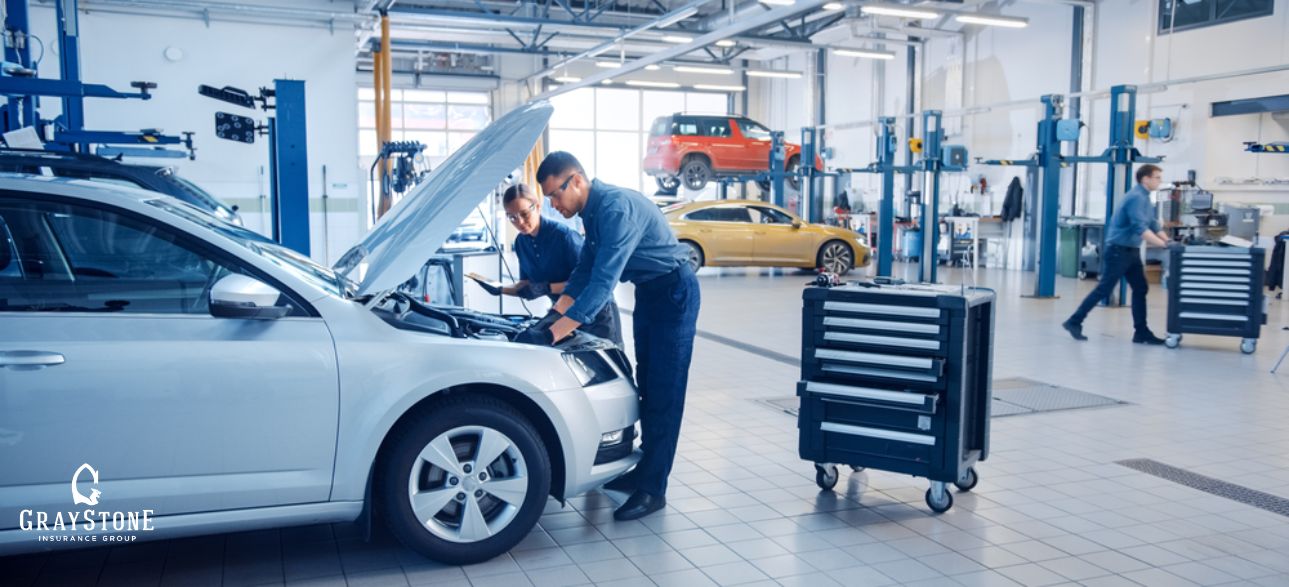
For business owners in the automotive industry—from small auto repair shops in Austin and bustling car dealerships in Dallas, to high-end service centers in New York and valet services in Tampa—insurance is a critical part of a successful operation. Your business thrives on trust, but the fast-paced, high-stakes environment presents unique risks. A single incident can jeopardize your financial stability, and a common point of confusion between two essential policies can leave you dangerously exposed.
At GrayStone Insurance Group, we understand that “garage insurance” is not a one-size-fits-all solution. Our expertise lies in clarifying the distinctions and tailoring a comprehensive plan that protects your business from every angle. This article will break down the crucial differences between Garage Liability and Garagekeepers insurance and explain why most automotive businesses need both.
Garage Liability Insurance: Protecting Your Business from the Public
Think of Garage Liability insurance as the automotive equivalent of a Commercial General Liability (CGL) policy. It is designed to protect your business from claims of bodily injury or property damage to third parties that arise from your business operations. This is your primary defense against lawsuits and claims brought by customers or the public.
What Garage Liability Covers:
According to data on common claims, slip-and-fall incidents and other general liability issues can result in significant legal and medical costs, with average settlements ranging from $10,000 to $50,000. These are the claims that happen on your premises and are a direct result of your business operations. [Source: The Hartford, via Insureon]
Garagekeepers Insurance: Protecting Your Customers’ Property
Garagekeepers insurance is a completely separate and equally vital policy. Its sole purpose is to provide coverage for customers’ vehicles while they are in your “care, custody, or control” for service, repair, storage, or parking. If a car is damaged or stolen while on your premises, this is the policy that responds.
What Garagekeepers Covers:
When a customer trusts you with their vehicle, they expect it to be returned in the same condition. A single incident involving a high-value car—which are common in cities like New York and Denver—can cost tens of thousands of dollars to repair or replace. A Garagekeepers insurance policy ensures you don’t have to bear that burden alone.
The Crucial Distinction and Why You Need Both
These two policies are not interchangeable. Garage Liability protects you from claims from the public, while Garagekeepers protects your customers’ vehicles. To be fully protected, a business in the automotive industry needs both.
Consider this common scenario: A fire breaks out in your Austin auto repair shop.
Without both policies, you would be left with a major financial gap. You might be protected from a lawsuit for the fire, but you would still be liable for the thousands of dollars in damage to your customers’ vehicles. This is a risk no business can afford to take.
|
Feature |
Garage Liability Insurance |
Garagekeepers Insurance |
|
What it Covers |
Bodily injury & property damage to third parties from business operations. |
Damage to a customer’s vehicle while in your care, custody, or control. |
|
Typical Claims |
Slip-and-fall accidents, faulty workmanship, test drive accidents. |
Fire, theft, vandalism, hail, or employee collision damage to a customer’s car. |
|
Who it Protects |
The business owner from lawsuits. |
The customer’s vehicle (which, in turn, protects the business). |
|
Is it Mandatory? |
Often a condition of state licensing or required by contracts. |
Not legally mandatory, but essential for reputation and financial security. |
FAQs for Automotive Business Owners
Q1: Is Garage Liability insurance mandatory to operate my business? A: In many states, including Florida and Colorado, obtaining a motor vehicle dealer or repair shop license requires proof of a surety bond and/or garage liability insurance. While not universally mandated for all types of automotive businesses, it is a non-negotiable requirement for many, and a crucial protection for any business that interacts with the public.
Q2: What is “Products-Completed Operations” coverage? A: This is a key part of a robust Garage Liability policy. It covers claims that arise from injuries or property damage caused by a faulty product you sold or a faulty service you performed, after the customer has left your premises. For an auto shop, this would cover a claim that a customer’s vehicle accident was caused by a repair you completed last week.
Q3: Does my Commercial Auto policy cover a test drive? A: A standard Commercial Auto policy covers vehicles you own and use for your business. It does not cover a customer’s vehicle or a vehicle for which you have taken “care, custody, or control.” That is the job of Garage Liability (for third-party injury/damage from the test drive) and Garagekeepers (for damage to the customer’s vehicle itself).
Q4: What if a customer has their own insurance? Do I still need Garagekeepers? A: Yes. Relying on a customer’s insurance can be a bad business decision. It can lead to disputes, damage your reputation, and cause a major legal headache. While a customer’s policy might cover the damage, a Garagekeepers policy (especially Direct Primary coverage) ensures you can take responsibility immediately, providing a seamless and professional customer experience
Q5: What is the difference between Legal Liability, Direct Excess, and Direct Primary Garagekeepers coverage? A: These are the three main options.
Your Partner in Automotive Insurance
In the dynamic and highly-regulated automotive industry, understanding your insurance is not just a best practice—it’s a necessity. From the specific licensing requirements in New York to the severe weather threats in Texas and Florida, an independent broker with a multi-state presence like GrayStone Insurance Group can provide invaluable insight. We work with a network of carriers who specialize in the automotive industry, ensuring you have a custom-built insurance solution that protects your business from every angle.
Don’t let a single claim put your hard-earned reputation at risk.
Contact GrayStone Insurance Group today for a comprehensive review of your garage and auto business insurance needs.
Local Resources: